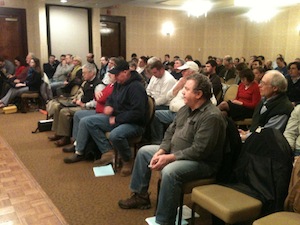On the drive back from yesterday's New England Fishery Management Council meeting in Portsmouth, N.H., I was contemplating the massive cuts to Gulf of Maine and Georges Bank cod catch limits that start with the 2013 season when The Doors came on the car stereo and seemed to sum up the day's events.
"This is the end," Jim Morrison sang, "my only friend, the end."
Sadly, the line from the classic rock chestnut echoes the opinions of long-suffering fishermen attending the council meeting. They saw the council, after a day of lengthy debate, cut the Gulf of Maine cod catch from 6,700 metric tons to 1,550 for the next three years. The Georges Bank cod harvest took a significant hit, too, down to 2,506 metric tons through 2015.
Groundfishermen also learned they'll be required to bear half the costs for at-sea monitoring because the NMFS budget doesn't have funds to assume the full cost.
"You're at the end right now, I mean this is what we're seeing," Vito Giacalone of the Northeast Seafood Coalition told the council. "I do not have a member that can come to our board and say 'How do I get by next year?' We used to be able to give them an answer and we're out of answers."
Fishermen said the economic effect of the cuts upon the industry will be far more dire than the council's projections. Even if the Gulf of Maine catch limit was 1,800 metric tons it wouldn't be enough to sustain an inshore fisherman, Giacalone told the council.
"That's game over for the inshore Gulf of Maine, that's for sure," he said.
NMFS Northeast region administrator John Bullard said he remembered back when Amendment 5 was going to be the death knell for the industry. "Since then there's been a slow, steady strangulation, shrinkage, a consolidation of the fishing industry," he said. "We're headed slowly, seemingly inexorably towards oblivion."
The cause of fishermen's pain, Bullard said, is the lack of enough cod for people to make a living. "What we do about it, about people's ability to survive while we do that — that's what's before us."







